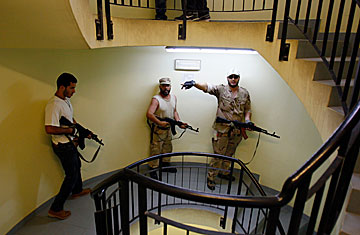
Libyan rebels search a house in Tripoli, Libya, on Aug. 24, 2011
(2 of 2)
Like other self-appointed hunting squads, Sherrif's undertakes its own interrogations before transferring its captives to Matega. On a recent weekday, two of their newest captures are women charged with organizing and paying "lady volunteers" to support the regime during the uprising, Sherrif says. One headed Gaddafi's Ministry of Women's Affairs. They are currently under interrogation "because when they talk, they give names, and names are very important," he adds.
But his biggest prizes, Hadi al-Berej and Mohamed Abdo, are sitting in a ground-floor bedroom, where in their plain yellow djellabas and quiet passivity they almost blend in with the furniture. The men's wan 67-year-old faces seem to defy the positions of power they so recently held. But neither denies who he is or what his job was. Al-Berej was the head of Gaddafi's security-operations room, from which he coordinated security operations across the country. Abdo was a member of that six-man control room as the head of Gaddafi's military police and Abu Salim prison. Both men were captured on Aug. 30. They were surprised when the rebels didn't kill them — a fact that Sherrif and other rebel officials proudly trumpet to distinguish themselves from Gaddafi's brutality.
But Sherrif and his men have little sympathy for the men's insistence that they were just following orders and trying to leave the regime. "These guys have done a lot to us, and they don't want to say it," Sherrif says later. "I have documents that Berej gave orders to burn 'the rats' — documents signed by Berej to burn us."
Abrahams of Human Rights Watch confirms that, at least by his observations, the detainees have been well treated: "They received medicine and visitors. The one complaint is the utter lack of judicial procedures. That's a larger issue [for all detainees]. It's understandable."
Ad hoc prisons have sprung up in schools and offices all over rebel-held territory, which now encompasses most of populated Libya, holding suspected mercenaries and Gaddafi loyalists. But the rebels have also sometimes swept up foreign workers, particularly African migrants. And Abrahams says it has been impossible to determine just how many prisoners of war there are because the prisons are so loosely organized and random.
Sherrif admits there is more work to be done. About 90 miles (145 km) to the southeast, another group of rebel forces is engaged in a fight to conquer Bani Walid, a regime stronghold where two of Gaddafi's sons and his spokesman are believed to be hiding. The fact that they might still be there doesn't surprise Sherrif. "You know the mouse?" he asks, launching into a metaphor. "He puts his foot in the glue, and oh! He's stuck. So what does he do?" Sherrif makes a struggling motion with his arms. "He puts his second foot in the glue. And oh! Then the other foot, and then the other." Quickly, the mouse has worsened his situation, all the while trying to extricate himself. "That is what Gaddafi and his sons are doing right now," Sherrif says. One by one and day by day, he expects the Libyan rebels will catch all of them.
